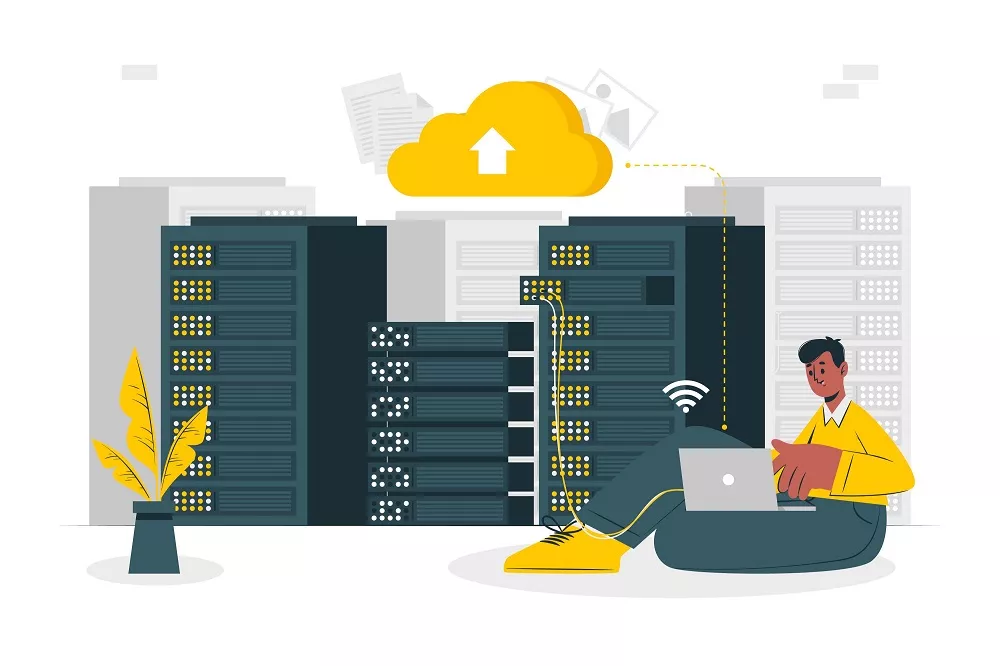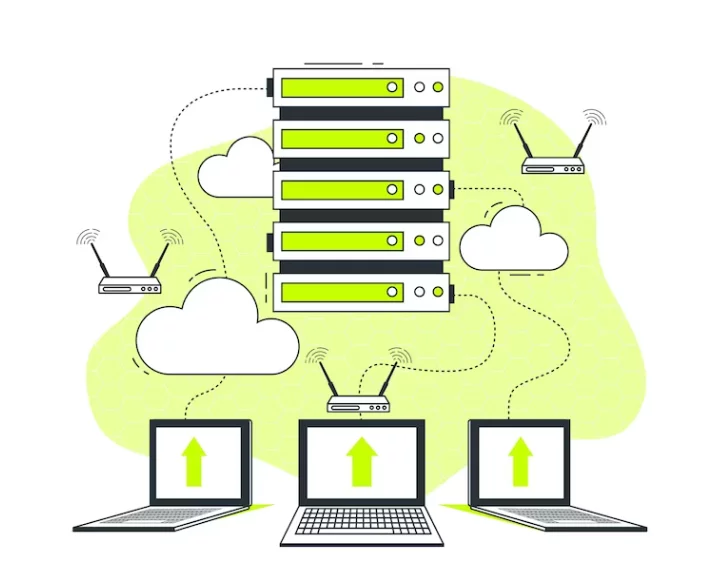Websites and online services are the lifeblood of businesses and individuals alike, the choice of hosting can significantly impact performance, security, and scalability. Among the array of hosting options available, VPS hosting stand out as a versatile and powerful solution. Let’s dig deep into the world of VPS hosting. Whether you’re a seasoned webmaster or just starting your online journey, understanding VPS hosting can be a game-changer.
What is a Virtual Private Server?
A Virtual Private Server, or VPS, is a server on which computer software is installed and accessible via an internet connection. The name gives a clearer picture of what you can expect from this product. Virtual Private Server can also be termed as ‘own virtual server’. As a fairly wide audience views Nestify Blog, I will briefly explain the term ‘server’ below.
A server is a computer consisting of a combination of, among other things, working memory (RAM), computing power (CPU), and hard disks (HDD) on which software is installed to run programs. An example of a software package is a control panel, such as Plesk, for web hosting. This package brings together many tasks in an interface and simplifies administrative management.
Over the years, different types of software have been developed to make virtualization and its servers possible. With this development, it became possible to split the primary resources of a server, such as working memory and disk space, into multiple virtual servers (VPSs) so that a server can have different users. Each VPS has its own operating system with root access to perform tasks as Administrator.

For whom is VPS suitable?
In many cases, physical servers allow more resources than is required for a computer program. Having a physical server run for a relatively small program is often ‘overkill’ since, in such a case, a smaller server also suffices. Ordinarily, a VPS grants sufficient flexibility, making it an excellent alternative to a physical server.
Nevertheless, due to this flexibility, a VPS is not suitable for everyone. An operating system is installed on a VPS, on which you can log in via the root user. Next, various responsibilities come into play, such as the installation of programs, but also consistent maintenance in connection with, for example, safety. In addition, it is desirable to monitor the installed programs for accessibility so that the user experience is always positive and visitors want to come back.
In short, are you a person who is technically skilled and who knows how to deal with computer systems? Then, you fall under the group of users for whom a VPS might be interesting.
When do you opt for a VPS?
A VPS is interesting for tailor-made solutions, for example, a webshop with specific installations or own programs that require root access to a system. However, technical knowledge is not always required and hosting providers can also take on responsibilities and tasks as described above. In such a case, there is a Managed VPS.
What is Managed VPS hosting?

Managed VPS hosting is a hosting service in which the hosting provider manages most of the technical aspects of managing your virtual private server (VPS). This management includes tasks such as server setup, software installation, security updates, monitoring, and regular maintenance. With managed VPS hosting, you can focus on your website or application’s content and functionality while the hosting provider handles the server’s infrastructure and performance, ensuring it runs smoothly and securely. It’s a convenient option for users who may not have the technical expertise or time to manage a VPS themselves. Here are some of its key features:
- Server Setup: When you opt for managed VPS hosting, the hosting provider will set up the virtual private server for you. This includes configuring the operating system, installing necessary software (such as a web server like Apache or Nginx, a database server like MySQL, and other required tools), and allocating resources like CPU, RAM, and storage.
- Security: Security is one of the important elements of hosting. Managed VPS hosting providers typically implement robust security measures. They set up firewalls, regularly update and patch the server’s software to protect against vulnerabilities, and often offer features like DDoS protection and intrusion detection to safeguard your data and applications.
- Monitoring and Maintenance: Hosting providers actively monitor your VPS to ensure it’s running smoothly. They keep an eye on server performance, resource usage, and network connectivity. If any issues arise, they proactively address them. Regular maintenance tasks, such as backups and system updates, are also handled by the provider.
- Technical Support: Managed VPS hosting often comes with 24/7 technical support. If you encounter any problems or have questions about your server, you can reach out to the hosting provider’s support team for assistance. They can help troubleshoot issues, provide guidance, and offer solutions to server-related problems.
- Scalability: Managed VPS hosting providers offer scalability options. As your website or application requires more resources, you can upgrade your VPS plan to administer increased traffic and demands. The hosting provider will assist with this process.
- Backups: Regular backups of your data are crucial to prevent data loss. Managed VPS hosting providers often include automated backup services, ensuring that your web data is systematically and regularly backed up and can be restored in case of accidental deletions or server failures.
- Software Updates: Keeping server software updated is vital for security and performance. Managed VPS providers handle the responsibility of applying software updates and patches, reducing the risk of system vulnerabilities that could be exploited by malicious actors.
What is the difference between Shared Hosting and VPS Hosting?

Shared hosting and VPS hosting are separate hosting solutions with key differences:
- Resource Allocation:
- Shared Hosting: In shared hosting, multiple websites share the same server resources (CPU, RAM, storage). This means your website shares these resources with other sites hosted on the same server. Resources are distributed among users, which can lead to performance limitations if other sites on the server experience high traffic or resource usage.
- VPS Hosting: VPS hosting provides dedicated resources within a virtualized environment. Each VPS operates independently with its allocated CPU, RAM, and storage. This isolation ensures that your website’s performance is not affected by the activity of other VPSs on the same physical server.
- Control and Customization:
- Shared Hosting: Shared hosting offers limited control and customization options. Server configurations are managed by the hosting provider, and users typically have access to a control panel for managing their website settings.
- VPS Hosting: VPS hosting provides greater control and customization. You have root or administrative access, allowing you to configure the server as needed. You can install and customize software, adjust server settings, and have more flexibility in resource allocation.
- Performance:
- Shared Hosting: Shared hosting can be less predictable in terms of performance. If other sites on the same server experience high traffic or resource demands, it can slow down your website’s response times.
- VPS Hosting: VPS hosting offers more consistent performance since you have dedicated resources. Your website’s performance is less affected by the activities of neighboring VPSs.
- Security:
- Shared Hosting: Security is reliant on the hosting provider’s measures. While providers implement security protocols, the shared nature of the hosting environment means that vulnerabilities on other hosted sites could potentially impact yours.
- VPS Hosting: VPS hosting provides better security through isolation. Your VPS is separate from other VPS on the same server, lessening the risk of security breaches caused by neighboring websites.
- Scalability:
- Shared Hosting: Shared hosting is limited in scalability. As your website grows and demands for more resources, you may eventually outgrow the shared hosting environment.
- VPS Hosting: VPS hosting offers scalability options. You can demand for an upgrade to your hosting provider’s VPS plan to accommodate increased traffic and resource demands without changing your hosting environment.
What’s the difference between cloud hosting and VPS?

The primary distinction between VPS and cloud hosting lies in their infrastructure. VPS operates on a single physical server, whereas cloud servers are distributed across a network of interconnected physical servers. With a cloud server, you have the flexibility to accommodate your resources based on your requirements. Read the blog to get a better understanding of the difference: VPS Hosting Or Cloud Hosting: Which One To Consider?
What is the role of VPS hosting providers?
A VPS works on a physical server that is joined to a network via a router. VPS hosting providers manage this underlying infrastructure up to the root of the VPS, which the user subsequently manages. The infrastructure has been put together for high accessibility and the right support and advice.
Who are the Best VPS Hosting Service Providers of 2023?
- IONOS: Best overall
- GoDaddy: Best for affordability
- Nestify: Best for scaling businesses
- DreamHost: Best for free email
- Hostinger: Best for transparency
- Hostwinds: Best for choice
- MochaHost: Best money-back guarantee
- HostGator: Best for resources on all tiers
Is VPS hosting secure?
VPS hosting services offer the same type of security measures that you would find with other types of hosting services. It can be secure, but its level of security depends on various factors:
- Server Configuration: Properly configured VPS servers with up-to-date software and security patches are more secure. It’s crucial to follow security best practices when setting up and maintaining your VPS.
- Isolation: VPS hosting provides isolation between virtual servers, lessening the risk of security breaches caused by other users on the same physical server. However, it’s not as isolated as dedicated server hosting.
- Operating System Security: The security of your VPS also depends on the security of the chosen operating system. Regularly updating the OS and using security measures like firewalls and intrusion detection systems enhances security.
- User Responsibilities: Users are responsible for safeguarding their VPS instances. This includes setting strong passwords, applying security updates, and configuring security features.
- Software Security: The security of the software and applications running on the VPS is crucial. Ensure you keep all software and plugins updated and follow security best practices for the specific applications you use.
- Backup and Recovery: Implementing regular backups and having a disaster recovery plan in place can mitigate data loss in case of security incidents.
- Monitoring and Intrusion Detection: Utilizing monitoring tools and intrusion detection systems that can help identify and respond to security threats in real time.
- Provider Security: The hosting provider’s security measures also impact VPS security. Select a reputable provider with a strong reputation in security.
How many websites can I host with a VPS?
In technical terms, there’s no strict limit to the number of websites that can be hosted on a VPS. The only restriction should be the total amount of resources allocated to your VPS.
Why do we need to optimize a WordPress VPS?
Optimizing a WordPress VPS is crucial for ensuring your WordPress website runs efficiently, loads quickly, and can handle increased traffic.
Also Read: 7 Practical Tips For WordPress VPS Optimization
To conclude,
Virtual Private Server (VPS) hosting presents a robust, scalable, and secure solution for hosting websites, applications, and services. Its ability to provide dedicated resources, isolation, and customization makes it a favored choice for individuals and businesses of all sizes. As technology continues to advance, VPS hosting remains a reliable foundation for establishing and maintaining a strong online presence. Whether you’re seeking more control, better performance, or enhanced security, VPS hosting can be your key to success in the ever-evolving digital landscape. So, explore the world of VPS hosting and take your online endeavors to new heights.



